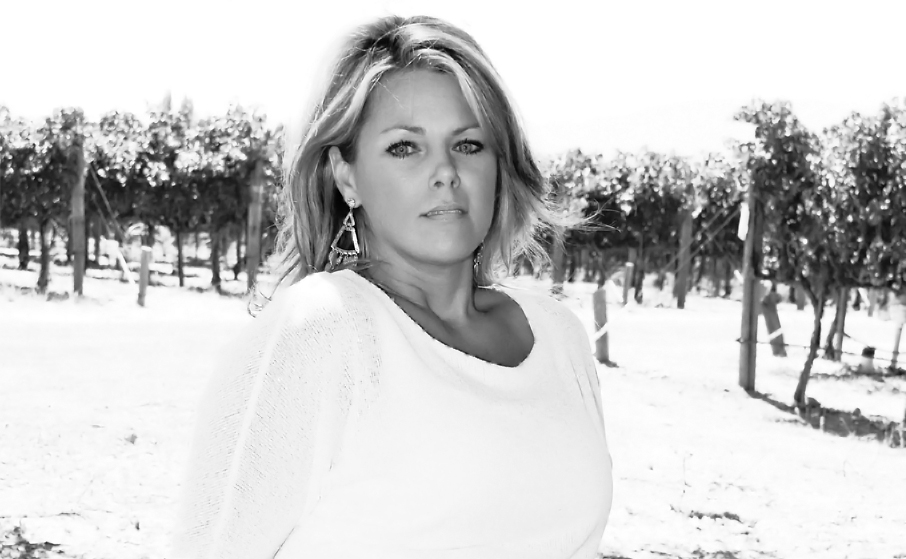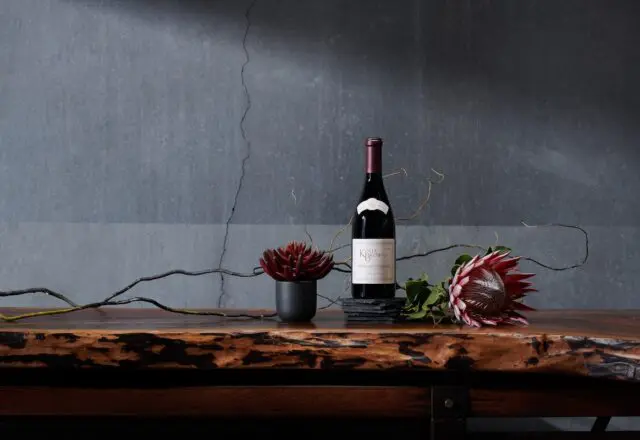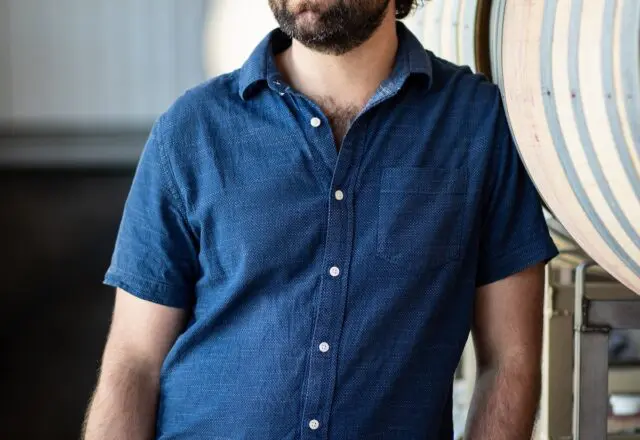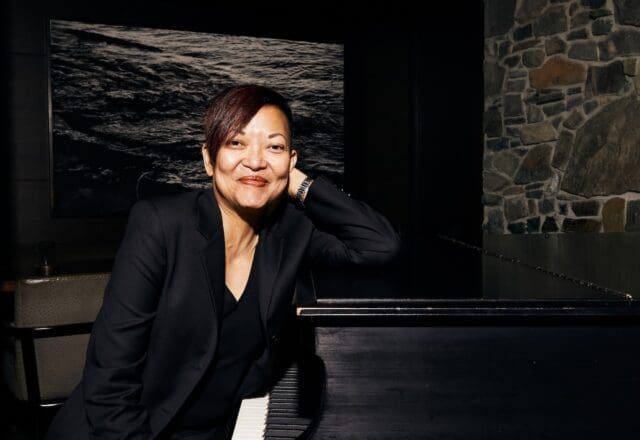Texan Turned California Grapes Guru Has Cried and Army-Man Crawled for Good Wine
The Passion and Nerve of Sarah Francis
BY James Brock
Sarah Francis, a passionate vigneron, speaks her mind with enthusiasm. (Courtesy Sarah Francis)
I love to talk about wine with people who share my passion for it. We open bottles, we trade stories about travel and soil types, terroir and residual sugar, and we talk of taste and food and restaurants. We recommend wines to one another, we drink, and we learn a lot.
In Wine Talk, I introduce you to some of my friends, acquaintances, and people I meet as I make my way around the world, individuals who love wine as much as I do, who live to taste, who farm and make wine. You’ll appreciate their insight, and I hope you’ll learn something from them as well.
Earlier this year, I had the pleasure of meeting Sarah Francis in person for the first time. I was with a small group of people on the patio at Solage, including several winemakers. At the time, I was part of a company, Monopole Wines, that represented Francis’ wines in Texas.
We were in Napa and Sonoma visiting some of our producers. My first impression of her? Verve, passion and more passion. (She was born in Texas, after all.)
We discussed her father, who had been involved in the construction of Dallas’ Reunion Tower, and her grandmother’s garden, which contained a few grape vines. As a young girl, Francis set puppet shows amid those vines, and credits those experiences as the catalyst for her future as a vigneron.
On that patio, we drank some of her Chardonnay and Cabernet Sauvignon, excellent vintages that moved me. Her wines are not inexpensive, but they are worth the time to get to know. As is she. I look forward to sharing a table with her again soon.
PaperCity: Tell us about three wines you think are drinking well at the moment. What makes them worthwhile? How about a food pairing for each one?
Sarah Francis: I’ll start with the 2003 Beaux Frères Beaux Freres Vineyard Pinot Noir, which you can find for around $75. It pairs excellently with Frenched lamb chops (prepared simply with fresh rosemary, sea salt, pepper and olive oil). You can get other vintages at various merchants or directly from the source.
Next, the 2012 Domaine Chevillon-Chezeaux “Les Saint-Georges” (look for it for around $95 at Total Wine). In my opinion, this wine pairs well with your life, no food necessary. Drink often.
Finally, the 2018 Figuière Rosé Première Côtes de Provence. I love to drink this with ceviche, and it’s $29 a bottle. (Buy it here.)
PC: If cost was no consideration, tell us the one bottle you would add to your personal collection, and why.
SF: A 1999 Domaine Leroy Chambertin Grand Cru. Or a 1986 Domaine Henri Jayer Richebourg Grand Cru. Why? Lalou Bize-Leroy is my sacred benchmark of Burgundy, and our vigneron philosophies align as soulmates. Only wine I’ve ever had (1999) that magically captures my favorite flower, the peony.
And for the Henri Jayer: first, hand destemming. Then, regenerative vigneron inventor, inventor of cold-soak maceration, limited quantities — less is more. Lastly, only winemaker in the world that makes me want to bow my head in the presence of his wines.

PC: What is your favorite grape, and why?
First, Pinot Noir. It is elusive. It demands excellence and extreme unique terroir profiles and pushes my vigneron abilities beyond what my mind could ever imagine.
Cabernet Sauvignon: Only grape I’ve ever army-man crawled out of a vineyard for. Constant care and perfection in farming requires thousands of hours meticulously caring for the vines by hand. I lose track of time; 16 hours later, at dusk, I realize I cannot stand up straight or walk — no worries, drop to the ground and army-man crawl to the farm truck.
Go home, hot bath, get up at sunrise and do it again. The wines reflect this commitment, passion and love. They make time stand still for me. They are profound. They are indescribable.
PC: How about one bottle that our readers should buy now to cellar for 10 years, to celebrate a birth, anniversary, or other red-letter day?
SF: How about the 2015 Sarah Francis The Leo Vineyard Cabernet Sauvignon? I dry-farmed by hand this less than one-ton vineyard. It is the most remarkable vineyard, and the most amazing vigneron experience I’ve had in my lifetime. This wine changed my life. It is regal, it is layered with complexity, and will take you a lifetime to uncover all of its treasures.
I plan on sharing it with my daughter, Faith Raymer, who is my assistant winemaker and also the assistant winemaker for Russell Bevan. We will enjoy this wine now and again in 10 years, and then again in 20 years with her and my great-grandchildren. This is a legacy wine for the generations.
PC: Where is your go-to place when you want to have a glass or bottle?
SF: My go-to place is Evangeline in Calistoga. Sasan Nayeri, the owner, knows my palate, and the food pairings cannot be beat, everything from seafood to the best Cajun Creole food is available here. It is a French bistro with a Cajun Soul.
PC: If there was one thing you wish everyone would keep in mind when buying and drinking wine, what is it?
SF: Stop and smell the wine and experience the wine by holding it and savoring it as you breathe it in. Most of what you can taste in wine is experienced in the nose. You will miss out on this if you don’t take the time to savor this moment. The most difficult aspect of winemaking, in my opinion, is capturing the nose in a vintage. Many winemakers can get the palate expression, but getting the nose and palate expression is an elusive thing. There is no hurry. Take all the time you can enjoy focused on experiencing the nose of a wine.
Also, single-vineyard designates are special. Start there, buy and learn these wines. Wines should be different each vintage. Understand this deeply.
PC: What is your “wine eureka moment,” the incident/taste/encounter that put you and wine on an intimate plane forever?
SF: Stepping into a vineyard, I experienced the silent, unspoken language of God; it is called stillness. I’ve been enjoying this dialogue in a vineyard since I was 4 years old.
As far as wine, it was an Araujo Eisele Vineyard Cabernet Sauvignon, 1995. Elegance defined. It made me want to learn all about Napa Valley. This wine led me to Beckstoffer To Kalon, which set my worldview toward farming and becoming a vigneron. I’m also very fond of the Moraga Vineyards Bel Air (2001); it opened my mind about California wines. These are the California wines that shaped my vigneron spirit.
PC: What has been the strangest moment/incident involving wine that you have experienced in your career?
SF: Perhaps when I cried in To Kalon with Andy Beckstoffer and he told me to get in the truck. He drove me to Carneros and convinced me to make a Burgundian Chardonnay. I had come to California with a suitcase and a dream to make Cabernet. He challenged me to make a Burgundian-style native-yeast California Chardonnay and prove the depth of California Chardonnay.

Every vintage for the last nine years, Chardonnay has caused me to break down and cry — I blame it all on Andy. Obviously, he knew that I would need to be challenged and humbled as a farmer and winemaker every vintage so that I wouldn’t get to big for my britches. Chardonnay is the most difficult wine for me to make as a winemaker. Every vintage my customers praise my Chardonnays, but they have no idea how the grape tests me and teaches me each vintage. I’m thankful that Andy told me to stop crying and get in the truck that day.
Another time, I was having a complete meltdown of stress as it began to rain during a harvest —I was crying again — and I looked up at the sky and yelled, “God, where are you? Why did you bring me this far to cause me to fail now?!” I was on the sorting table and the sky cleared, the rain stopped, and I looked to my right and a priest was standing there. He reached out his hand and shook mine and said, “I was driving by and God told me to stop here and come say a blessing over your grapes; is that OK?” Through my tears I smiled and replied, “Yes, please.”
He blessed the grapes got in his car and left. The staff around me just looked on with amazement, and I looked at the sky and said, “God is good! Thank you, God!”
PC: What is your favorite wine reference in a work of literature?
SF: “And Noah, a man of the soil, began to be an husbandman, and he planted a vineyard” (Genesis 9.20). This was the first Bible verse I learned as a child and memorized. I think it was telling me something.















_md.jpeg)

